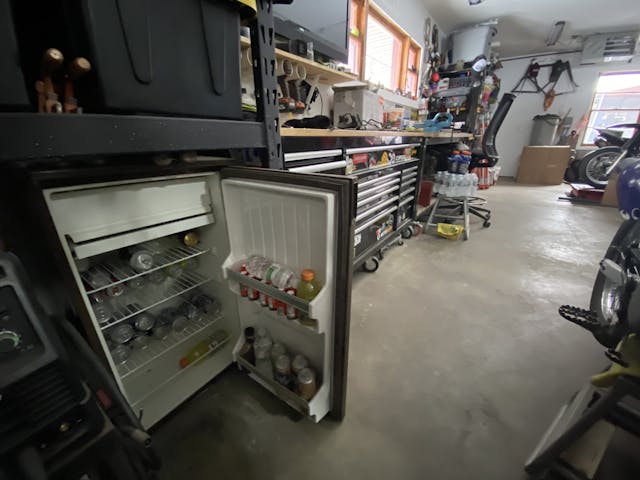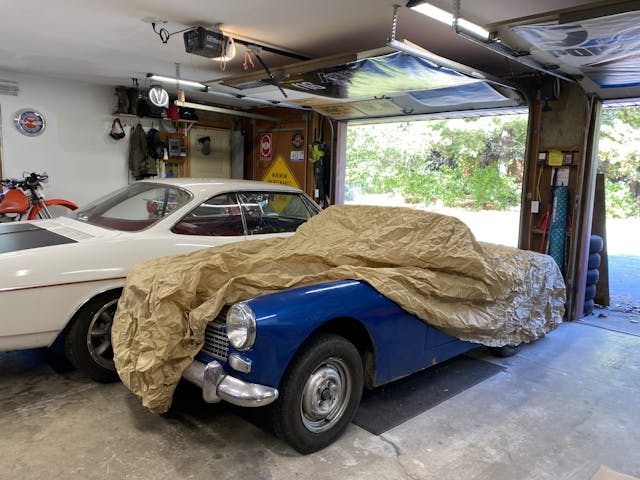4 Things Silently Killing Your Vintage Car
You click the ignition key one detent to the right. A quick twitch of the right foot to tickle the accelerator pump and set the choke. Another touch on the key and . . .
Nothing.
What should be a crescendo of eight trumpets playing the V-8 version of taps and stirring the car person’s soul awake is instead the painful silence punctuated by the soft click of the ignition cylinder returning to the off position. Wake up, it’s just a nightmare.
At least, for now it is. It could happen to you, though. Nature is a cruel mistress who is conspiring against us and our cars and doing so both vigorously and silently. Here are four main offenders to keep your eye on, since your ears aren’t going to help.
The Garage Fridge

Current moving around inside an electric motor—like the compressor of a refrigerator—produces ozone, and that combined with sunlight can age tires and other rubber parts very rapidly. Replacing dry-rotted but otherwise fine parts gets expensive and annoying very quickly. If you are like me and aren’t ready to give up the fridge or freezer, focus on keeping sunlight away from your vintage ride.
Corrosion

Deep inside your car, there is a war being waged between materials and nature. Hate to break it to you, but nature always wins. That means rust and other types of corrosion are leeching into the metals and connections that not only shape your car but also make it functional and easily serviceable. For every joke about “hearing a car rust” there are five cars that rusted away before the owner even noticed.
Being Parked

Sitting is the last thing cars were designed to do. All of the silent killers, and a few of the noisy ones, attack when the car is laying dormant. These things gain ground while the car is waiting, only for us to claw back some ground with our occasional drives. Oil coatings slip off and leave dry-start conditions inside an engine that could drive an owner to doing the extra work of priming an engine just to go driving. That’s only for those who are both aware and care enough to take that action. For many, ignorance is bliss when turning the ignition key and hearing the rumble through the exhaust pipes.
Friction

Fine, I’ll concede this one is not always silent, but with or without noise, excess friction is making your vintage car smaller with every drive. I’m not even talking about the intentional friction from brake or clutch lining, but instead about the metal-to-metal contact that was never designed to be that way. Grease and oil are subject to gravity just like us, so keeping oil and grease in the right spot is a never-ending task as they silently slide and ooze past seals and gaskets. One small drop on the garage floor might not seem like a big deal but over time can mean lots of very worn-out parts that seemingly happened out of nowhere.



I turned 70 last January. I have a 1976 Sportster I restored a number of years ago that I can no longer ride due to a hitch in my get-along. I’m selling it next spring. I also have a houseboat I have owned for 24 years which is in beautiful condition but maintenance is relentless. I decided a couple of weeks ago to sell it as well as the juice is no longer worth the squeeze. I’m planning on doing more traveling and working on my C3 Corvette. I have owned a lot of toys over the years but unfortunately it’s time to start simplifying my life.
Hey, Kyle. Thank you for including reference to a motorcycle in this article – in this case a super cool ’72 Yamaha AT2 125cc Enduro, with electric start! Motorcycles are indeed particularly susceptible to storage issues as they are quite often “pushed into a corner and forgotten about”. Note, the suggested “leaking seal” in the case of bike illustrated is a quite common issue among vintage two strokes. Main seals. They dry up and can no longer effectively keep out air on the ignition side of the crank and/or keep oil out on the clutch side. Continually deal with just that on many vintage “smokers”.
Perhaps there are other things creating ozone, but don’t think a refrigerator is one of them. Compressor motors are completely contained in the closed loop refrigerant system. Fans are also induction only. Ozone is created by sparks/arcing like universal AC/DC motors like in a vacuum cleaner. Electric welding would be a better guess.
Came here expecting Hagerty to provide an article that would go above and beyond relating to the causes of rubber rot and moisture from rising air under non-garaged vehicles, and suggestions for avoidance.
Instead, there’s one mildly interesting note about compressors and ozone, and the rest is garbage not worthy of Doug DeMuro’s infinite ignorance.
Sorry, but this is another bit of clickbait trash wasting server space and corroding the internet.
P.S.: Plus, come to think of it, the ozone thing is probably BS in the first place – as Doug pointed out, these are closed loop sytstems – so this article really should be retitled “Hagerty’s lowest-rent author comes up with 4 things to silently kill your brain cells.”
The only nugget, if you will and if not already known, is letting a car sit for months and not run. Outside of that there was nothing in this article that concerns me and my 11 cars here in California. However, it was interesting seeing all the over 70 crowd lamenting age. I’m 71 and besides my cars, which basically need just upkeep now, I spend Wednesdays and Saturdays from 0900-1800 hours restoring an aircraft carrier. That means walking steel decks and climbing up and down anywhere from 60-80 stories in a day. Mon, Tue, Thur, and Fri are in my office with Sun for car maintenance. Retirement is almost a decade away by choice.
My Aunt just turned 90. She is letting go of the 1979 Corvette she ordered. Just 13k miles on it. I’d have it already but at 6’5″ it’s hard to get into. That and the wife stated that I would have to sell the 70 SS 454 Elcamino.
I am still driving my 1929 Model A Ford to church that I worked on with my dad while I was in high school. It still runs great but needs some cosmetic work as I used it as my regular car for many years while in college and law school. Plans are to have my grandson and his dad take it over and update it to looking and working like new.
I just turned 70 and have had a ‘69 Mach I for 31 years. I say you are always going to look good in a vehicle from your era. It’s when old guys like me have to lower themselves into a new ‘Vette , well, we all know that vehicle was made for our grands and not for us, just doesn’t ‘sit’ right with me!